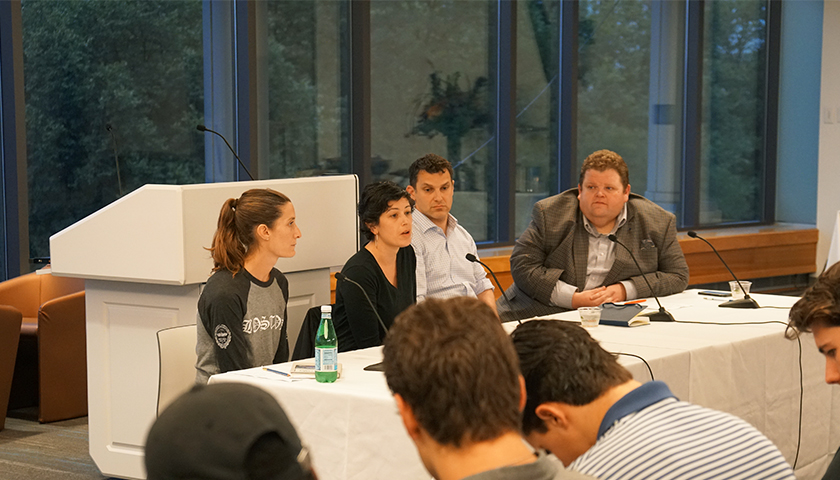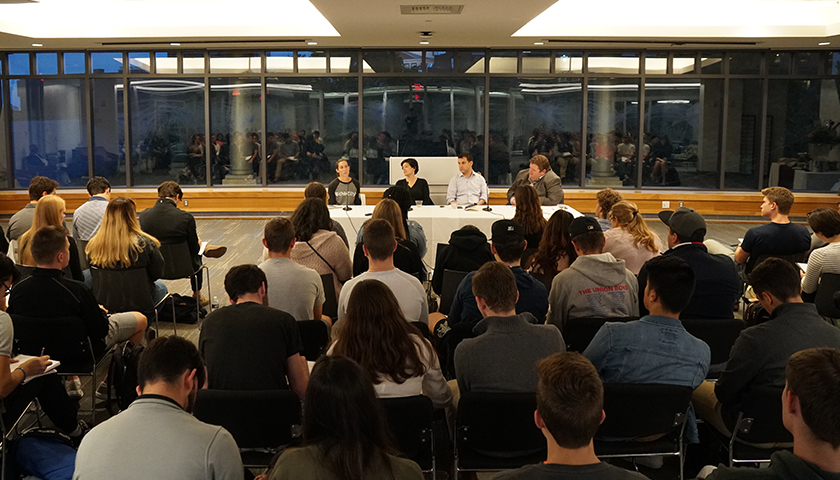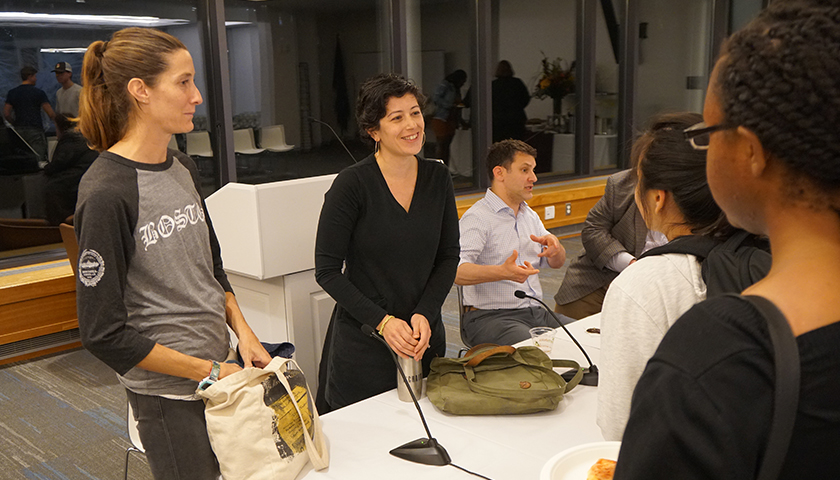Business Education Meets Social Justice

Can businesses focus on social responsibility and still sustainably grow their bottom line?
That was the question put to a panel of local business owners who view their companies through a social justice lens. About 80 Sawyer Business School honors students in the ENT 101 “Business Foundations” course listened in as business owners spoke of their commitment to pay equity, hiring non-traditional workers and donating services. Each showed students that businesses can indeed do well while focusing on doing the right thing. In fact, a commitment to social justice can even improve business performance, some said.
The panelists, along with moderator RJ McGrail, MPA ’06, are members of the Alliance for Business Leadership, a non-partisan coalition of CEOs, entrepreneurs, investors, and business leaders who believe social responsibility and the sustainable growth of the Massachusetts economy are interconnected.
“We never consciously established fair labor practices. We were just trying to do the right thing for our guys.”
Jane Hobert and her husband didn’t have a business plan when they started their moving company. According to Hobert, they’ve been figuring things out as they go. “Everything we’ve learned, we’ve learned the hard way,” she told the students.
But they’re obviously doing something right. The Other Guys Moving Company has been growing for ten years. And along the way the company has built a reputation for being honest business owners with integrity. Their social justice focus? Paying their “unskilled workers,” as they’re classified in payroll lingo, above the industry standard and helping nonprofits like Cradles to Crayons or the Greater Boston Food Bank. “We try to do anything that helps children or marginalized communities,” said Hobert.

Approximately 80 undergraduates attended the event.
“It was really important for us as a social mission not to red line the benefits of green energy.”
After earning an MBA and MPA and starting a career in investment banking and venture capital, Zaid Ashai pivoted to become CEO of Nexamp, a full-service solar energy solutions company. “I wanted to be an operator, not in finance,” he said. The company currently has about 200 employees, with offices in Boston, Chicago, San Diego, and Washington, DC.
One social justice focus for Nexamp—and something that sets them apart from other solar providers—is that when they sell power, they don’t ask for a credit or FICO score. The goal is to make solar power available to more people, without a bank’s stamp of approval. They also go out of their way to focus on diversity, equity, and inclusion (DEI) when it comes to recruiting new employees. “What's the best way you can use DEI to do the right thing with a work force and improve business performance?” Ashai asked the students.

“There are some things that are non-negotiable in the way that we run our business, even during challenging times.”
“We could buy non compostable containers and it would be half the price,” explained Rachel Miller Munzer, co-owner of three different Cambridge-based restaurant concepts: Mamaleh’s Delicatessen, Café du Pays, and the State Park bar.
That would be especially appealing to a restaurant in a time of growth, when capital is king. Instead, though, Miller Munzer and the other owners have sacrificed their own salaries to be able to pay employees a living wage, serve good product, and “do the right thing,” like composting and paying for straws that aren’t plastic.
They also do a revenue share in which a percentage of food revenue goes to a fund that benefits kitchen employees. It helps offset the inequity with wait staff, who can earn lucrative tips. “That means that when it’s busy, everyone’s making money from the top down,” Miller Munzer says.
Contact
Greg Gatlin
Office of Public Affairs
617-573-8428
Ben Hall
Office of Public Affairs
617-573-8092



